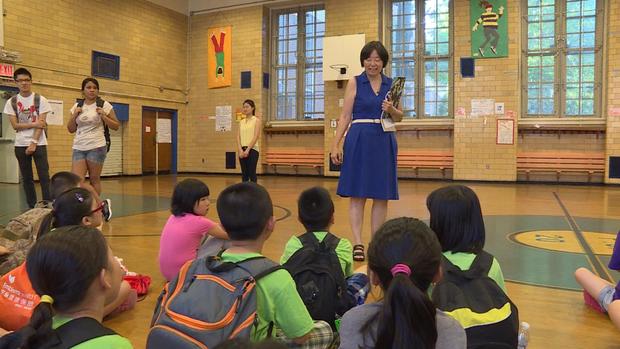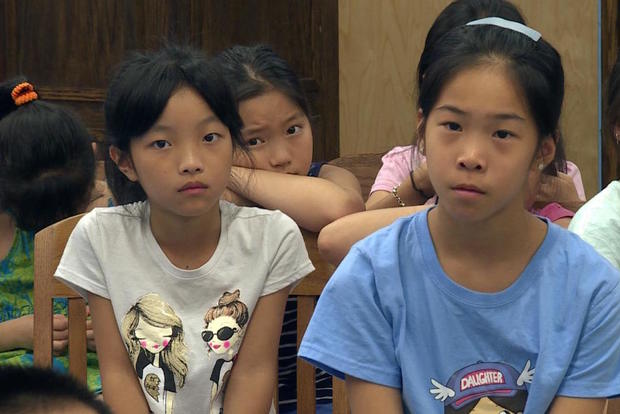Helping "satellite babies" thrive in the U.S.
QUEENS, N.Y. -- David Chen, 24, was less than a year old when his parents sent him to China's Fujian Province to be raised by his grandparents. His parents had recently immigrated to the U.S. and were working 14-hour shifts at multiple restaurants, often seven days a week, in hopes of a better future for the family. At the age of 5, Chen's parents brought him back the U.S. to enroll in school.
"I do remember crying a lot because being taken away by people you barely know... it was pretty hard," said Chen. "I was attached to my grandma."
Chen was unable to fully form a relationship with his parents after arriving from China. The separation from his grandparents was so traumatic that he began having suicidal thoughts in the third grade.
"Growing up I didn't have that connection with [my parents] so I didn't really know how to discuss my feelings with them," he said. "I was so boxed off and I didn't talk to them at all, they felt I was very angry child at home."
Dr. Yvonne Bohr and researchers from York University in Ontario, Canada, have been studying separations like Chen's since 2006. They coined the term "satellite babies" to refer to infants that have been shuttled back and forth from one country to another between different sets of caregivers who live thousands of miles apart.
"Babies are often sent away just around the time when they have just developed a strong attachment to their biological parents and as a result they may experience distress during [this] separation," said Bohr. "When they return, the parents in turn may expect the child to be very happy to be home, often not understanding that for that child this isn't home anymore."
Bohr, a clinical psychologist, said infants have very rich emotional lives and need consistent caretakers that they can trust and feel confident will protect them. How babies adjust to separations much depends on how sensitive their successive caregivers were able to be.
According to anecdotal information, some satellite babies "may show acting out behavior on return to their parents because they are confused and angry, and have difficulty regulating their emotions," she explained. Others "may start being pleasing to the new adult in their life because ... they don't know how long this relationship will last. Those are the kids who may be at risk of getting depressed in the future."
Lois Lee, director of the Chinese-American Planning Council, a non-profit that provides child care services and helps satellite babies adjust to life in America, says sending young children back and forth between the two countries is a common cultural trend among many Chinese immigrant communities.
"It is almost acceptable in China, they feel that this is part of growing up in America," said Lee. "No parent wants to give up their child, but [there are] a lot of sacrifices that immigrants have to make, you know, to have a better life here."
At a child care program Lee runs in Queens, more than 60 percent of the students are satellite babies. She notes that the transition can be difficult for parents as well as children.
"The parents have also lost five years of parenting skills. To have your child come back, you don't know the child's personality, what makes them happy or anything about your child," said Lee. "Then the child doesn't recognize the parent, so there is a real big disconnect. They lost that bonding period."
Eight-year-old twins Matthew and Rachel Cai and 9-year-old Jenny Zhuo were sent to China as infants and came back when they were around 4 years old. Although they are grateful for the years they spent getting to know their grandparents, they don't fully understand why their parents sent them away.
"I was confused, I didn't see my grandparents. They said it was my mom. ... When I got off the plane they said that but I cried because I thought, like, a stranger was taking me away," said Zhuo. "I couldn't remember who they [were], like I forgot them over the years when I was in China."
Many parents of satellite babies send their children overseas in part to preserve their culture. But experts say the overwhelming force behind this exodus is the lack of affordable child care.
According to the Economic Policy Institute, in 33 states and the District of Columbia, infant care costs exceed the average cost of in-state college tuition at public four-year institutions. In New York, for example, where the full-time minimum wage salary is $18,720 a year, the average annual cost of infant care is $14,144. This means that a minimum-wage worker in New York would need to work full time for thirty-nine weeks, or from January to September, just to pay for child care for one infant.
"If we had affordable early childhood education, and that also includes government subsidized programs, [parents] would not send their child back," said Lee. "The next president has to see the value in early child care education. There has been a big push for universal preschool, but what about the infants and the toddlers? They need to be taken care of too."
Lee mentored 16-year-old Vicky Pan, a former satellite baby who now volunteers at the child care program.
"The first night that I came here [back to the U.S.] I was crying. But I was crying really silently... because I didn't want to cause any trouble," said Pan. "I never told them how I felt.... The next day I would always be the shy girl again, I wouldn't say anything."
It took Pan an entire year to speak to her father.
"He was probably scared too," she said. "He [had not] seen me in four years, he didn't know what to say to me, he didn't know how I [felt], so he [felt] like silence was probably the best thing."
Lee says experiences like these are common among satellite babies and contribute to some behavioral problems.
"There are a lot of angry people in America, and you don't want to add to the anger, you really want to lessen it, you know, really make it a positive experience to live here," said Lee. "The children don't understand what is happening to them. They have a lot of anger issues. They didn't want to be sent away."
Researchers from Wellesley College, Beth Israel Deaconess Medical Center, and UMass Boston are conducting several studies to examine the stress, health, and wellbeing of families with satellite babies. For more information on how to participate, visit their website.



